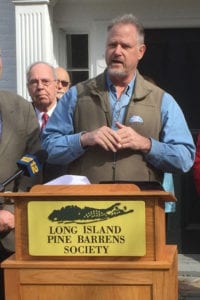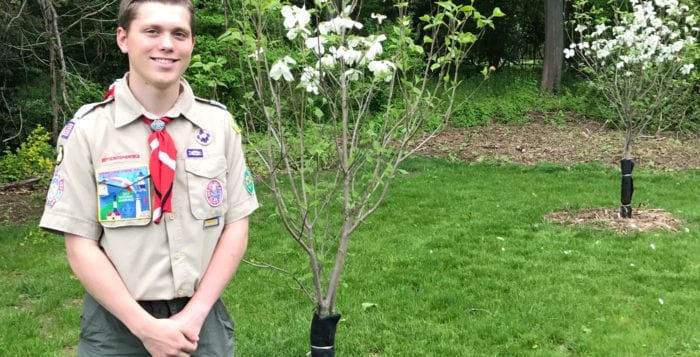By Anthony Frasca
A familiar face in the Setauket area is at the forefront of environmental preservation and conservation.
“It was good news when John and Georgia Turner moved to town,” said Robert Reuter, president of the Frank Melville Memorial Foundation. “John is a legendary leader for protection of the environment and an admired naturalist and educator.”
John Turner has been involved with numerous groups whose focus is on either open space preservation or environmental conservation. Town of Brookhaven Councilwoman Valerie Cartright (D-Port Jefferson Station) said she has considered Turner a vital resource since she was elected to office.
“I am constantly impressed by [the] scope of his knowledge about the town’s history and natural environment,” Cartright said. “His involvement with organizations such as the Long Island Pine Barrens Society, his teaching and author background, along with his constant desire to update existing knowledge with continued research makes John a wealth of information the town is lucky to have.”
The naturalist was co-founder of the Long Island Pine Barrens Society, a group whose mission is to promote education, to advocate for the protection of Long Island’s drinking water and to preserve open spaces especially in the Pine Barrens. According to the society’s website, with a large swath of land in Suffolk County slated for development, the Long Island Pine Barrens Society filed suit in 1989 against the Suffolk County Department of Health and the town boards of Brookhaven, Riverhead and Southampton. At the time it was New York state’s biggest environmental lawsuit, leading to the Pine Barrens Act, thereby protecting the Pine Barrens and establishing the Central Pine Barrens Joint Planning & Policy Commission.

As a spokesman for the Preserve Plum Island Coalition, Turner has also been active in trying to prevent Plum Island from being sold and developed. The environmentally sensitive island is currently at the center of a swirling controversy and is the subject of a legal battle against the federal government under the Endangered Species Act and other laws, according to a TBR News Media July 14, 2016, story.
Made up of numerous diverse environmental groups, from the Connecticut-Rhode Island Coastal Fly Fishers to the North Fork Audubon Society, the Preserve Plum Island Coalition has advocated for the signing of a petition to save the island along with encouraging a letter-writing campaign to local elected officials. The island provides a habitat for a diverse variety of local and migratory wildlife.
Carl Safina, founder of the Safina Center at Stony Brook University and the endowed professor for Nature and Humanity in the School of Marine and Atmospheric Sciences, said he has worked with Turner on a variety of environmental initiatives on and off since the 1980s.
“I consider John Turner to be the finest naturalist, and among the top handful of most engaged conservationists on Long Island,” Safina said. “He’s a true leader.”
As the conservation chair of the Four Harbors Audubon Society, Turner led the Stone Bridge Nighthawk Watch this past fall. The group recorded and tallied nighthawk sightings at the Frank Melville Memorial Park in Setauket. A significant nighthawk population was noticed at the park in 2016 and the open vistas provided an important location for cataloging the bird’s migration. The nighthawk research was supported by the board of the park, another organization that, according to Reuter, Turner “has adopted with vigor.”
“We’ve walked every part of the park, looking for opportunities to improve habitat and interpret our diverse natural environment,” Reuter said. “The man certainly knows his plants and wildlife. He’s passionate about sharing his knowledge. Rather than just toss out ideas, John has prepared for the park a written blueprint for improvements and educational opportunities. It’s an honor to have his guidance.”
New York State Assemblyman Steve Englebright (D-Setauket) said he considers Turner one of the finest naturalists on Long Island.
“He has brought his ‘inner pied piper’ of the environment to Setauket at the Melville Bridge,” Englebright said. “I watched through the years as the crowd grew. He has helped bring an awareness of the tidal wetlands of Setauket Harbor and has done it in a gracious and compelling manner. He is truly extraordinary, the essence of what a naturalist should be. He’s a special part of our community.”







